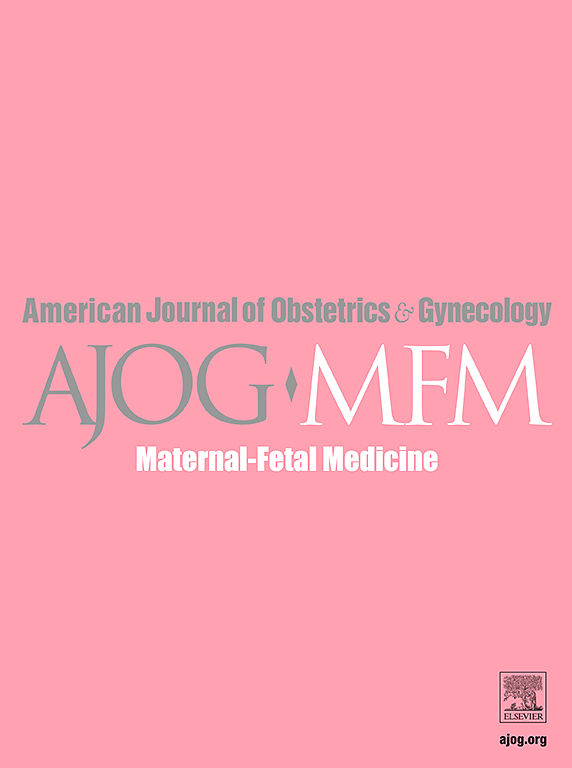A practical approach to the diagnosis and initial management of acute right ventricular failure during pregnancy using point-of-care ultrasound
IF 3.8
2区 医学
Q1 OBSTETRICS & GYNECOLOGY
American Journal of Obstetrics & Gynecology Mfm
Pub Date : 2024-10-10
DOI:10.1016/j.ajogmf.2024.101517
引用次数: 0
Abstract
Acute right ventricular failure is a critical condition in pregnancy that can lead to severe maternal and fetal complications. This expert review discusses the instrumental role of point-of-care ultrasound in diagnosing and managing ARVF in pregnant patients, highlighting its benefits for immediate clinical decision-making in obstetric emergencies. The unique physiological changes during pregnancy, such as increased blood volume and cardiac output, can exacerbate underlying or latent cardiac issues, making pregnant patients particularly susceptible to acute right ventricular failure. Common causes during pregnancy include pulmonary embolism, peripartum cardiomyopathy, and congenital heart diseases, each presenting distinct challenges in diagnosis and management. The real-time capability of point-of-care ultrasound allows for the immediate assessment of right ventricular size and function, evaluation of fluid status via the inferior vena cava, and identification of potential pulmonary embolism, offering a non-invasive, rapid, and dynamic diagnostic tool right at the bedside. The expert review details specific point-of-care ultrasound techniques adapted for pregnant patients, including the parasternal long and short axis and apical 4-chamber view, essential for evaluating right heart function and guiding acute management strategies. These include fluid management, adjustment of pharmacological treatment, and immediate interventions to support cardiac function and reduce ventricular overload. Point-of-care ultrasound enhances clinical outcomes by allowing clinicians to make informed decisions quickly, reducing the time to intervention, and tailoring management strategies to individual patient needs. However, despite its apparent advantages, the adoption of point-of-care ultrasound requires specialized training and familiarity with obstetric-specific protocols. This review advocates for the integration of point-of-care ultrasound into standard obstetric care protocols, emphasizing the need for clear guidelines and structured protocols that equip healthcare providers with the skills necessary to utilize this technology effectively. Future research should aim to refine these protocols and expand the evidence base to solidify the role of point-of-care ultrasound in improving maternal and fetal outcomes in acute right ventricular failure.
使用护理点超声诊断和初步处理妊娠期急性右心室衰竭的实用方法。
急性右心室功能衰竭是妊娠期的一种危急情况,可导致严重的母体和胎儿并发症。这篇专家综述讨论了护理点超声在诊断和管理妊娠期患者急性右心室功能衰竭方面的重要作用,强调了其在产科急诊中即时临床决策的优势。妊娠期间独特的生理变化(如血容量和心输出量增加)会加重潜在或潜在的心脏问题,使妊娠患者特别容易发生急性右心室衰竭。孕期常见的病因包括肺栓塞、围产期心肌病和先天性心脏病,每种病因都给诊断和治疗带来了不同的挑战。护理点超声的实时功能可立即评估右心室的大小和功能,通过下腔静脉评估体液状况,并识别潜在的肺栓塞,从而在床边提供一种无创、快速和动态的诊断工具。专家评论详细介绍了适用于妊娠患者的特定护理点超声技术,包括胸骨旁长轴和短轴以及心尖四腔切面,这些技术对于评估右心功能和指导急性管理策略至关重要。这些策略包括输液管理、调整药物治疗以及支持心脏功能和减轻心室负荷过重的即时干预。护理点超声检查可让临床医生迅速做出明智的决定,缩短干预时间,并根据患者的不同需求制定相应的管理策略,从而提高临床治疗效果。然而,尽管护理点超声具有明显的优势,但采用护理点超声需要接受专门培训并熟悉产科专用方案。本综述主张将护理点超声纳入标准产科护理方案,强调需要明确的指南和结构化方案,使医疗服务提供者掌握有效利用该技术的必要技能。未来的研究应旨在完善这些方案并扩大证据基础,以巩固护理点超声在改善急性右心室功能衰竭的孕产妇和胎儿预后方面的作用。
本文章由计算机程序翻译,如有差异,请以英文原文为准。
求助全文
约1分钟内获得全文
求助全文
来源期刊

American Journal of Obstetrics & Gynecology Mfm
Medicine-Medicine (all)
CiteScore
7.40
自引率
3.20%
发文量
254
审稿时长
40 days
期刊介绍:
The American Journal of Obstetrics and Gynecology (AJOG) is a highly esteemed publication with two companion titles. One of these is the American Journal of Obstetrics and Gynecology Maternal-Fetal Medicine (AJOG MFM), which is dedicated to the latest research in the field of maternal-fetal medicine, specifically concerning high-risk pregnancies. The journal encompasses a wide range of topics, including:
Maternal Complications: It addresses significant studies that have the potential to change clinical practice regarding complications faced by pregnant women.
Fetal Complications: The journal covers prenatal diagnosis, ultrasound, and genetic issues related to the fetus, providing insights into the management and care of fetal health.
Prenatal Care: It discusses the best practices in prenatal care to ensure the health and well-being of both the mother and the unborn child.
Intrapartum Care: It provides guidance on the care provided during the childbirth process, which is critical for the safety of both mother and baby.
Postpartum Issues: The journal also tackles issues that arise after childbirth, focusing on the postpartum period and its implications for maternal health. AJOG MFM serves as a reliable forum for peer-reviewed research, with a preference for randomized trials and meta-analyses. The goal is to equip researchers and clinicians with the most current information and evidence-based strategies to effectively manage high-risk pregnancies and to provide the best possible care for mothers and their unborn children.
 求助内容:
求助内容: 应助结果提醒方式:
应助结果提醒方式:


